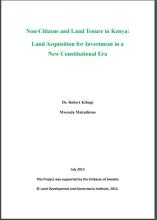/ library resources
Showing items 1 through 6 of 6.Land ownership in the United States is understood as a bundle of sticks representing rights to sell, lease, bequeath, mine, subdivide, develop, and so forth. The right of exclusion allows owners to prevent others from exercising a right of access.
This paper examines how tourism as a form of land use and economic development is a critical site of struggle over the meaning of neoliberalism, landscape and land rights in northern Tanzania.
The acquisition of land by foreigners in developing countries has emerged as a key mechanism for foreign direct investment (FDI).
In developing countries, forests play an important role in supplying goods and services. These ecosystems are under many stresses due to unsustainable management practices, lack of clarity on tenure and access rights, and persistent pressure for land-use change.
Little is known about the effects of mud crabs population patterns on their exploitation. We used complementary approaches (experimental, fisher-based) to investigate how small-scale variations in density, size and sex-ratio related to the ecology of S.
Land Library Search
Through our robust search engine, you can search for any item of the over 73,000 highly curated resources in the Land Library.
If you would like to find an overview of what is possible, feel free to peruse the Search Guide.



